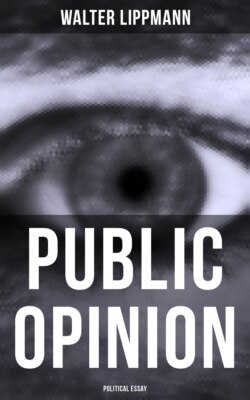Читать книгу Public Opinion: Political Essay - Walter Lippmann - Страница 35
На сайте Литреса книга снята с продажи.
3
ОглавлениеThere is economy in this. For the attempt to see all things freshly and in detail, rather than as types and generalities, is exhausting, and among busy affairs practically out of the question. In a circle of friends, and in relation to close associates or competitors, there is no shortcut through, and no substitute for, an individualized understanding. Those whom we love and admire most are the men and women whose consciousness is peopled thickly with persons rather than with types, who know us rather than the classification into which we might fit. For even without phrasing it to ourselves, we feel intuitively that all classification is in relation to some purpose not necessarily our own; that between two human beings no association has final dignity in which each does not take the other as an end in himself. There is a taint on any contact between two people which does not affirm as an axiom the personal inviolability of both.
But modern life is hurried and multifarious, above all physical distance separates men who are often in vital contact with each other, such as employer and employee, official and voter. There is neither time nor opportunity for intimate acquaintance. Instead we notice a trait which marks a well known type, and fill in the rest of the picture by means of the stereotypes we carry about in our heads. He is an agitator. That much we notice, or are told. Well, an agitator is this sort of person, and so he is this sort of person. He is an intellectual. He is a plutocrat. He is a foreigner. He is a "South European." He is from Back Bay. He is a Harvard Man. How different from the statement: he is a Yale Man. He is a regular fellow. He is a West Pointer. He is an old army sergeant. He is a Greenwich Villager: what don't we know about him then, and about her? He is an international banker. He is from Main Street.
The subtlest and most pervasive of all influences ere those which create and maintain the repertory of stereotypes. We are told about the world before we see it. We imagine most things before we experience them. And those preconceptions, unless education has made us acutely aware, govern deeply the whole process of perception. They mark out certain objects as familiar or strange, emphasizing the difference, so that the slightly familiar is seen as very familiar, and the somewhat strange as sharply alien. They are aroused by small signs, which may vary from a true index to a vague analogy. Aroused, they flood fresh vision with older images, and project into the world what has been resurrected in memory. Were there no practical uniformities in the environment, there would be no economy and only error in the human habit of accepting foresight for sight. But there are uniformities sufficiently accurate, and the need of economizing attention is so inevitable, that the abandonment of all stereotypes for a wholly innocent approach to experience would impoverish human life.
What matters is the character of the stereotypes, and the gullibility with which we employ them. And these in the end depend upon those inclusive patterns which constitute our philosophy of life. If in that philosophy we assume that the world is codified according to a code which we possess, we are likely to make our reports of what is going on describe a world run by our code. But if our philosophy tells us that each man is only a small part of the world, that his intelligence catches at best only phases and aspects in a coarse net of ideas, then, when we use our stereotypes, we tend to know that they are only stereotypes, to hold them lightly, to modify them gladly. We tend, also, to realize more and more clearly when our ideas started, where they started, how they came to us, why we accepted them. All useful history is antiseptic in this fashion. It enables us to know what fairy tale, what school book, what tradition, what novel, play, picture, phrase, planted one preconception in this mind, another in that mind.
